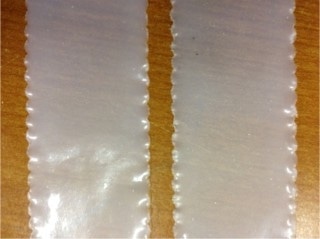Mar 17 2016
Eggshells, when placed on end, can be as strong as the arches holding the ancient Roman aqueducts. However they easily crack in the middle, prompting us to throw them away. Researchers suggest that adding tiny eggshell pieces to bioplastic can create a biodegradable packaging material, a first-of-its-kind, which bends but does not break so easily.
 Adding eggshell nanoparticles to a bioplastic (shown above) increases the strength and flexibility of the material, potentially making it more attractive for use in the packaging industry. (Credit: Vijaya Rangari/Tuskegee University)
Adding eggshell nanoparticles to a bioplastic (shown above) increases the strength and flexibility of the material, potentially making it more attractive for use in the packaging industry. (Credit: Vijaya Rangari/Tuskegee University)
The research is being presented at the American Chemical Society’s (ACS) 251st National Meeting & Exposition.
We're breaking eggshells down into their most minute components and then infusing them into a special blend of bioplastics that we have developed. These nano-sized eggshell particles add strength to the material and make them far more flexible than other bioplastics on the market. We believe that these traits — along with its biodegradability in the soil — could make this eggshell bioplastic a very attractive alternative packaging material.
Vijaya K. Rangari, Ph.D, Tuskegee University
The annual world production of plastics is approximately 300 million tons. Of this, about 99% is produced utilizing crude petroleum and other fossil fuels. Petroleum-based plastics have a lifetime into hundreds of years, without disintegration. If burned, the plastics emit carbon dioxide into the atmosphere, contributing to global climate change.
Bioplastics, a form of plastic produced from sweet potatoes, cornstarch, or other renewable plant-based sources, are a substitute, and they are easily biodegradable or decomposable when they are in the ground. However most bioplastics do not have the flexibility and strength needed to perform well for the packaging industry. A vast quantity of plastic is utilized to hold, wrap, and encase product, which most bioplastics would be unsuitable for. So petroleum-based products still dominate the market.
In order to find a solution, Rangari, graduate student Boniface Tiimob and colleagues at Tuskegee University, performed experiments with several plastic polymers. They decided upon a mixture containing 70% polybutyrate adipate terephthalate (PBAT), a petroleum polymer, and 30% polylactic acid (PLA), which is a polymer produced from cornstarch. Unlike other petroleum-based plastic polymers, PBAT begins to degrade within three months after burial.
This polymer mixture has many desirable properties, but the researchers wanted more flexibility from the material. Eggshells were used to create nanoparticles, as they are lightweight, porous and mainly composed of the easily decaying calcium carbonate.
The eggshells were washed and ground up in polypropylene glycol. Then the shell fragments were broken down to nanoparticles, which were over 350,000 smaller than the diameter of human hair, upon exposure to ultrasonic waves. In a laboratory setting a small fraction of the nanoparticles, shaped like a card deck, was infused into the 70/30 PBAT-PLA mixture. The infusion of the nanoparticles made the polymer mixture 700% more flexible, compared to the currently available bioplastics. This flexibility would be an ideal feature for grocery bags, retail packaging and food containers such as egg cartons.
Other than bioplastics, Rangari’s group is examining the use of eggshell nanoparticles to improve drug delivery, wound healing, and bone regeneration.
Rangari’s work received funds from the National Science Foundation and the Alabama Experimental program to Stimulate Competitive Research.